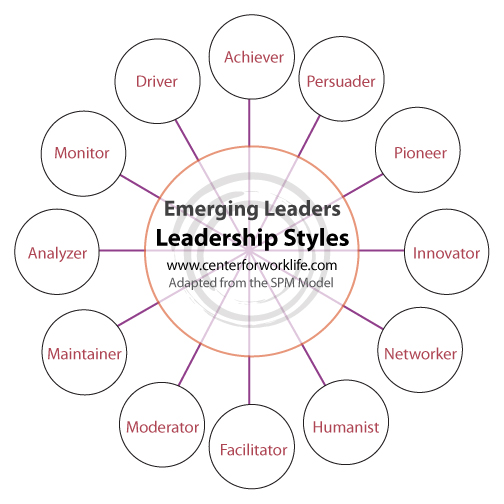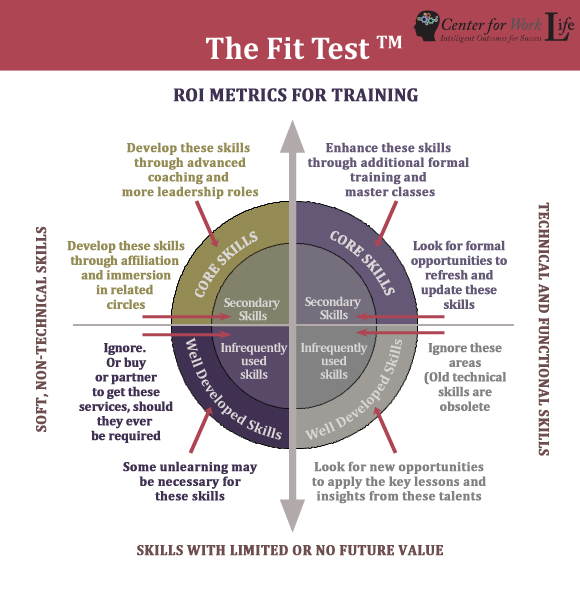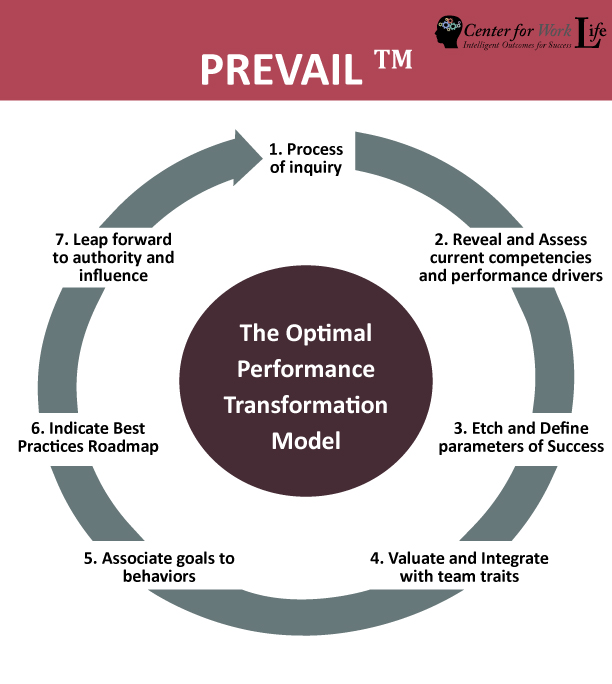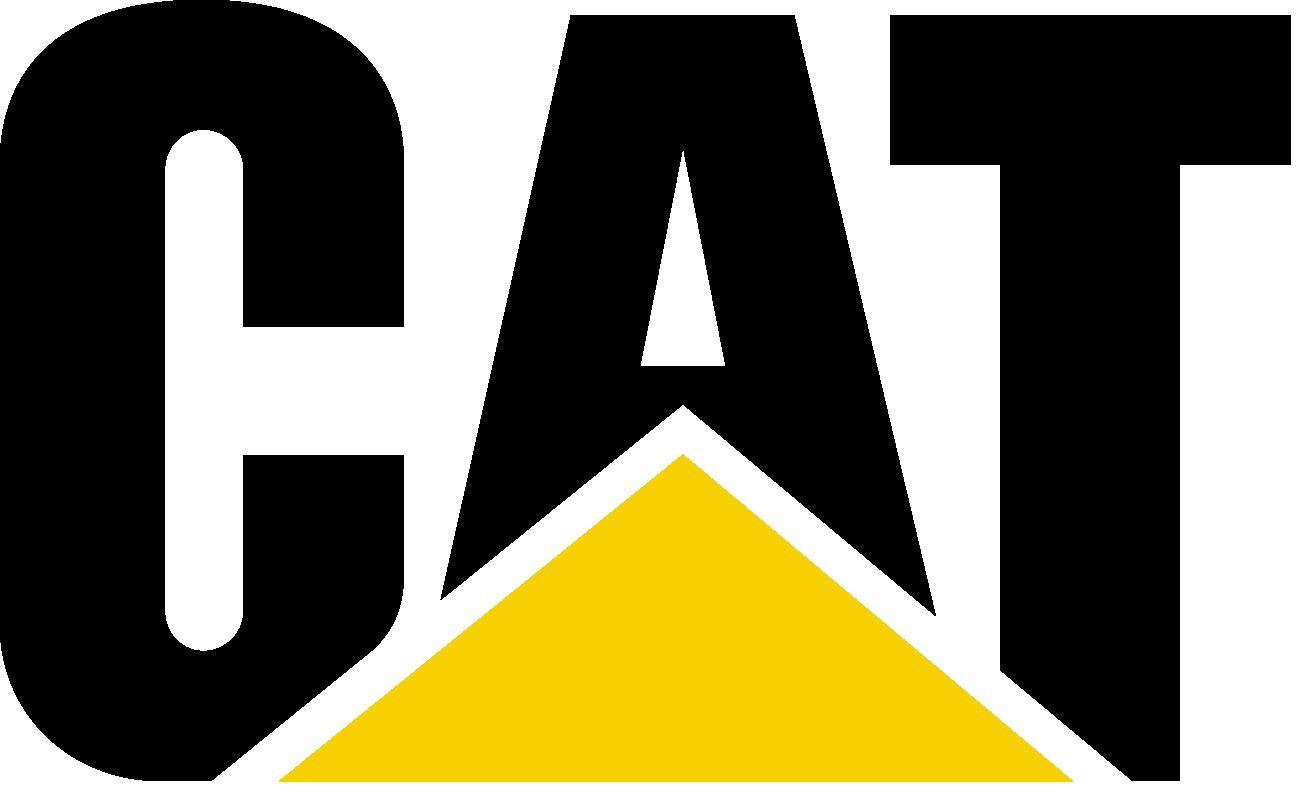Executive Coaching & Development
Executive Leadership Assessment
You are probably very ambitious, hardworking and goal driven. However if with your current skills, your goals of becoming a CEO, a Business Partner or a millionaire Business Owner magically came to fruition, would you be ready to take on the colossal challenge?
| Check out the Emerging Leaders Blog Series to determine your leadership style…  |
| Center for Work Life put on thinking caps to determine a method for reaching out and assisting leaders in the local Orlando community. The Emerging Leaders blog series is the result. Presentation Trainer, Marion Chapsal, developed a model of 12 leadership styles based on the SPM (Spony Profiling Model), created by Dr. Gilles Spony at Cranfield School of Management. This blog series features inspirational female leaders from the Central Florida area, some of which will include Sandi Vidal Executive Director at Christian HELP and Andria Herr, President of Hylant. Explore these leadership styles |
Leadership Coaching
As opposed to what many assume, leadership coaching is not meant for “problem employees.” To wait for performance reviews to dictate your development of your top performers’ performance plan is a pure waste of talent. CEO Careers are changing faster than they have in many decades. There is high competition over team leadership, and for executives to be in a better living leadership position, every individual needs to learn and acquire good leadership and management style.
Transformational Leadership
As opposed to previous literature regarding the difference between leadership and management, and discussing how transactional leadership no longer should have a seat at the table, current leadership effectiveness models emphasize transformational leadership at the heart of team leadership. A leader leads based on talent, and not titles. So what is Transformational Leadership?
James MacGregor Burns first used the term transformational leadership in 1978 to describe a process in which “leaders and followers help each other to advance to a higher level of morale and motivation.”
Leadership Styles of Transformational Leadership
- The pacesetting leader expects and models excellence and self-direction. If this style were summed up in one phrase, it would be “Do as I do, now.” The pacesetting style works best when the team is already motivated and skilled, and the leader needs quick results. Used extensively, however, this style can overwhelm team members and squelch innovation.
- The authoritative leader mobilizes the team toward a common vision and focuses on end goals, leaving the means up to each individual. If this style were summed up in one phrase, it would be “Come with me.” The authoritative style works best when the team needs a new vision because circumstances have changed, or when explicit guidance is not required. Authoritative leaders inspire an entrepreneurial spirit and vibrant enthusiasm for the mission. It is not the best fit when the leader is working with a team of experts who know more than him or her.
- The affiliative leader works to create emotional bonds that bring a feeling of bonding and belonging to the organization. If this style were summed up in one phrase, it would be “People come first.” The affiliative style works best in times of stress, when teammates need to heal from a trauma, or when the team needs to rebuild trust. This style should not be used exclusively because a sole reliance on praise and nurturing can foster mediocre performance and a lack of direction.
- The coaching leader develops people for the future. If this style were summed up in one phrase, it would be “Try this.” The coaching style works best when the leader wants to help teammates build lasting personal strengths that make them more successful overall. It is least effective when teammates are defiant and unwilling to change or learn, or if the leader lacks proficiency.
- The coercive leader demands immediate compliance. If this style were summed up in one phrase, it would be “Do what I tell you.” The coercive style is most effective in times of crisis, such as in a company turnaround or a takeover attempt, or during an actual emergency like a tornado or a fire. This style can also help control a problem teammate when everything else has failed. However, it should be avoided in almost every other case because it can alienate people and stifle flexibility and inventiveness.
- The democratic leader builds consensus through participation. If this style were summed up in one phrase, it would be “What do you think?” The democratic style is most effective when the leader needs the team to buy into or have ownership of a decision, plan, or goal, or if he or she is uncertain and needs fresh ideas from qualified teammates. It is not the best choice in an emergency situation, when time is of the essence for another reason or when teammates are not informed enough to offer sufficient guidance to the leader.
Orlando Executive Coaching Services
Center for Work Life is the only executive coaching program in Orlando that is completed by a trained and accredited psychologist. A strong executive coaching program is designed to help executives learn hands-on skills and motivate employees that are top performers to develop in the context of their current positions, but the only way this can be truly achieved is that the individual first gains insight into how their own behaviors shape their decisions and outcomes. A good leadership program is just as critical in its role in driving and preparing a leader as it is in thriving for their growth in this and future roles. Team leadership is a tough challenge and weak ethical leadership is worse than no leadership. For optimum results, careful planning and detailed practice is highly necessary.The program is designed to help you develop the critical skills you’ll need in your position including communication, conflict resolution, strategic planning, goal setting, diplomacy and value and ethics based decision-making. Many executives lead, but a few have a strong following. The Program provides opportunities to make adjustments in “real time.” By holding you accountable, your coach is able to unveil a pattern, provoke a deeper thinking, point to an Achilles tendon, leading to a signal and a shift in behavior. The experiential learning occurs when a question stimulates you to reach within for the answer.
In today’s fast-paced and highly competitive global economy, more and more individuals are realizing the importance of mentoring to unveil and mainstream the various components of their personal and professional life. Our program is designed to teach you to lead, so people listen, engage, and follow. Your coach will become a trusted advisor and an objective partner, guiding you throughout your transition.
Executive Coaching Program
The executive coaching program is specifically designed for you to master the top 10 leadership qualities and challenges. By conducting a thorough assessment of your current case, Dr. Hedayati will customize the program that best fits your needs and goals. You’ll work to build a comprehensive strategy, and create a plan for execution with real case, leading by example scenarios of a current or future CEO.
Here are some examples of areas of emphasis:
-Strategic thinking
-Decision making
-Influence/executive presence
-Leadership authenticity and transparency
-Communication and storytelling for buy-in
-Leading with emotional intelligence
-Conflict resolution and Assertiveness
As a business expert who has coached hundreds of CEO successors within Fortune 500 companies as well as government and non-profit agencies across the country and abroad, Dr. Namin-Hedayati is highly invested in helping you focus on bottom-line results, aligning the coaching process with the strategic goals of your company and the value and vision that you bring in to it.
Leaders and executives are a tremendous asset to an organization in that they bring years of experience to their functional area. They are driven and highly accomplished. However, as successful athletes have coaches to keep them at the top of their game, and commanders in chief have various counsels to keep them abreast of changes, a successful leader is best advised to take advantage of the 360 view that a coach can offer in developing their talent and career, interpersonal effectiveness and self sabotaging behaviors.
 Executive Coaching Metrics
Executive Coaching Metrics
Let’s face it; leadership development has become a catchphrase. Hiring organizations are just as responsible as the professional guidelines for what varieties of executive coaching programs exist out there. This is precisely the reason why, as a leader within the field, has partnered with Fortune 500 organizations from various industries, we stand by our results through a detailed evaluation of marked changes based on evaluative metrics. There’s a strong collaborative platform between goals and competencies and results. Just ask any Center for Work Life client, and they will tell you, the percent of executive level vacancies that were actually filled with an internal promotion vs. an external hire, and the percent of promotions that actually came from the high-potential pool we worked with.
Some examples of scenarios where coaching can be particularly effective are:
- Individual changes roles and takes on new responsibilities
- Individual seeks direction to overcome hurdles for better performance
- Individual feels burned out and frustrated
- Individual feels misunderstood
Is it time to hire an Executive Coach?
Deciding to hire an executive coach can originate from the individual themselves, from HR, or from upper management. Executive coaching is not the magic button to solve all business challenges and is not advice giving or mentoring. Executive coaching is a valuable resource wherever there is a need to:
- Coach for performance
- Coach for leadership skills development
- Coach for communication
- Coach for the executive’s agenda
Coaching is a partnership between the coach and the coachee. Each partner agrees to specific goals and desired outcomes. These adjustments allow the individual to grow and develop in their current roles, prepare for future opportunities, achieve optimal performance for business success and gain a competitive edge in the marketplace.
Executive Coaching Program Will:
1. Create a supportive environment where responsibility is shared
2. Encourage actions that support the organization rather than personal interests
3. Breakthrough status quo
4. Have freedom to set strategy and change direction
5. Earn genuine trust, respect, and admiration for your team through best communication
6. Influence performance and business impact beyond expectations
Executive Leadership Assessment
Center for Work Life of Orlando, Florida is an award-winning executive development firm providing leadership and management training to executives and organizations. Our main services include executive coaching, leadership development, executive succession planning, emotional intelligence training, career planning, staff development, and communication in the workplace.
Needs and topics addressed within these categories include: management styles, situational leadership, developing leadership qualities, executive recruitment training, work life balance, emotional intelligence training, work performance, stress management in the workplace, stress management activities, time management activities, team development, problem solving activities, management consulting training programs, professional communication, assertive communication coaching, interpersonal skills for top performers, effective communication styles, communication techniques, public speaking skills, presentation skills, and conflict management strategies.
Effective Public Speakers can be difficult to find, but Center for Work Life has that covered too. As a leadership, communications, and change management speaker, Dr. Farnaz Namin- Hedayati of Center for Work Life raises the bar in interactive presentations. We can also help companies conduct organization research and run focus groups.















